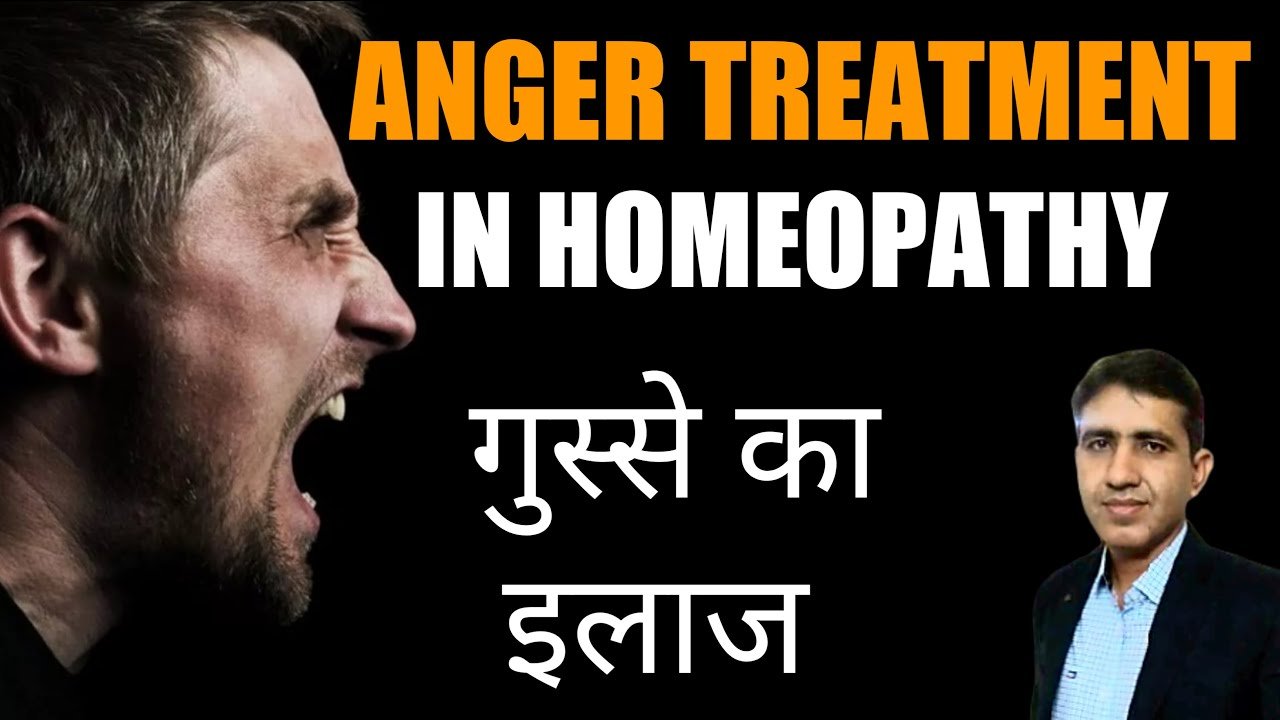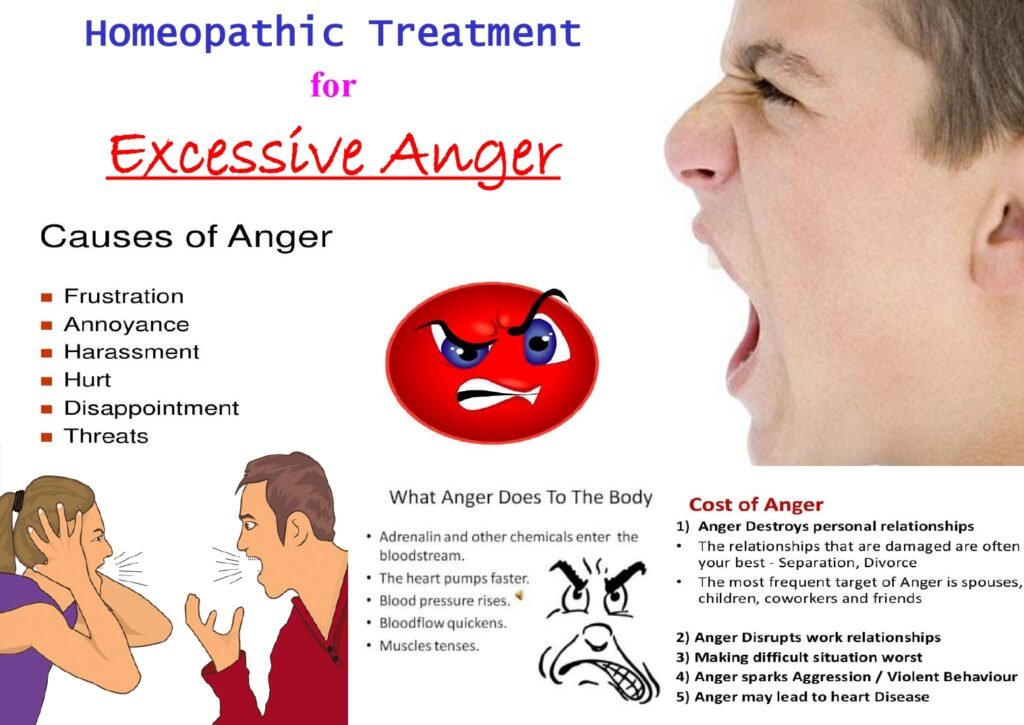Excessive Anger Homeopathy Treatment

Anger is one of the natural instincts in human behaviour. But when this anger goes beyond control, unhappy environment is created in one’s personality trait, in family life and social life. We see family feud, marital disharmony, separation of friendship and crisis in ethical values.

- Why we become angry?
Long-term poverty, debt-trap and financial crisis in the family lead a person to frustration which causes chronic anger. Excessive stress and tension in life-style, disgrace for dejection and failure in life, social deprivation and victimization because of injustice are major causes of excessive anger. Women who become victim of sexual molestation and violence are prone to show anger and rage. Unemployed youths and those who are victims of social, cultural and religious inequalities are very much expressive in anger. Incongruity between personal expectations and attainment leads us to become angry.
- How many types of anger are expressed?
More than 20-25 types of anger are expressed in human nature.
- Chronic Anger – This kind of anger is expressed from apathy and aversion to people surrounding us and from disgust in life.
- Paranoid Anger – From the sense of personal insecurity, envy and being mortified at another’s good or prosperity, excessive rage is expressed.
- Retaliatory Anger – This type of ferocious anger comes in mind from the intention of revenge to enemy.
- Passive anger – Some kind of displeasure, vexation and rage are expressed indirectly by making indecent gestures and by doing taunting remarks or utterances with ironical comments.
- Behavioural Anger – This type of anger comes from abnormal behavioural disorders because of acute or chronic mental illness. People with angry personality trait create tumultuous confusion being angry without cause.
- Judgmental Anger – If anyone becomes victim of outrage and tyranny, oppression and injustice without proper cause or motivatedly, he or she may be blinded with excessive rage.
- Aggressive Anger – From this type of awful malicious anger, we see aggressive behaviour and many kinds of psychiatric disorders. People become possessed with a murderous frenzy flying into a towering rage.
- Volatile Anger – This anger lasts very short span of time. Some anger comes on the spur of the moment and comes down in the next few moments.
- Depressive Anger – People, who suffer chronic anxiety and severe mental depression, are sunken in remorse and self-reproach. They express a natural anger for long term suffering.
- Moral Anger – Some people cannot tolerate degradation of socio-cultural ethical values and all-pervading moral degeneration. They get enraged and cherish hatred against anti-social elements of the society.
- What are the manifested physical symptoms of excessive anger?
Trembling of hands and legs, having palpitation of heart, flushed face, redness of eyes, increase in blood pressure, headache, physical exhaustion, etc. are important signs and symptoms of violent anger.
- Do people suffer in diseases due to excessive anger continuing for a long time?
Physical problems like indigestion, loss of appetite, constipation are common in anger. Heart attack and brain stroke (cerebrovascular accident) cannot be ruled out in the outcome of fierce anger. Besides, many mental problems come from formidable rage and atrocious anger. People suffer in panic attack, anxiety neurosis, depressive disorder, borderline personality disorder (BPD), insomnia etc. because of uncontrolled anger. Students suffer from temperament disorder, attention deficit hyperactive disorder (ADHD), autism spectrum disorder (ASD), learning disability (LD) and concentration deficit syndrome if they cannot manage anger.
- Which therapies are useful for anger management?
To bring anger under control, some therapies are very effective. Those are – 1. Anger Suppression Therapy 2. Cognitive Behaviour Therapy 3. Heart Coherence Training 4. Communication Skill Improvement Therapy 5. Relaxation Therapy and 6. Cognitive Restructuring Therapy.
All these therapies are used under the guidance of a clinical psychologist or a counselling psychotherapist to mitigate excessive anger. Mind that, if anger is transformed, it can be utilized as the source of inspiration. According to the researchers of psychology, angry people are more optimistic than others. Their anger can be reduced if the humane values are awakened in them. Anger can be properly controlled by bonding familial and social relationship. As a negotiation strategy, the use of anger is also well-known. As for example, the possibility of occurrence of malevolence and affray may be minimized if the revenge-wish is mitigated through anger.
- How can you manage and control your anger?
1. When anger goes beyond the limit, start taking deep breathing. It is very much effective to normalise increased heart-beat, high blood pressure and increased rate of exhalation caused by violent outburst of anger.
2. When you are in a state of angry mood, start counting from 100 to 1 in reverse order.
3. To pacify your mind and restrain your chronic anger, make phone-calls to your bosom friends, spend productive time in your kitchen-garden, listen favourite music, read ethical value-oriented books, read biography of high-souled men. If you can make time for half an hour, sit down with colour, brush and art-paper.
4. Practice yoga, meditation and cardiovascular exercise. During uncontrolled anger, neurotransmitter catecholamine is secreted from human brain which produces excessive energy in our body. If this energy is mitigated by doing physical exercise, outdoor games of jogging, excessive anger can be bridled. After 20-25 minutes of physical exercise, our body secretes a happy hormone called endorphin which helps us keep good mood.
5. Practice wit and humour to manage anger. Read humorous essays and watch entertaining television shows.
6. The most important cause of anger is stress and tension. There are several ways to become free from mental pressure and situational anxiety. Spend time with the children. If you can make intimacy with the kids with childlike simplicity, you’ll be free from stress and anxiety. You may get involved in religious activities.
7. Sweet fragrance makes us feel good mentally. Which is why, perfume is used to alleviate mental pressure. We all know that aromatherapy is passionately loved to ease tension in today’s era.
- How is the treatment done for anger-related abnormal behaviours?
Supportive and expressive psychotherapy techniques can manage unbridled anger. But when that anger causes psychiatric illness, medication is required for treatment. Now-a-days, some proven medicines in Allopathy and Homeopathy are being prescribed as mood stabilizer to address anger-related abnormal behaviour.
- Homeopathic Treatment of Uncontrolled Anger?
Excessive anger comes as the violent symptom of many neuro-psychiatric diseases. These can be highly controlled by Homeopathic medications. Chronic anger because of aversion to people around us and from disgust in social life. Aggressive awful malicious anger possessed with a murderous frenzy is greatly managed. We get many patients having Paranoid anger due to personal insecurity, envy and being mortified at another’s good or prosperity. When we face Behavioral anger with angry personality trait creating tumultuous confusion. People who suffer chronic anxiety and severe mental depression and are sunken in remorse and self-reproach suffer in depressive anger syndrome. Also other types of anger are greatly managed by homeopathic medicines. But none of these homeopathic medicines for Anger should be taken without professional advice from a consultant Homeopath or any spcialist.
